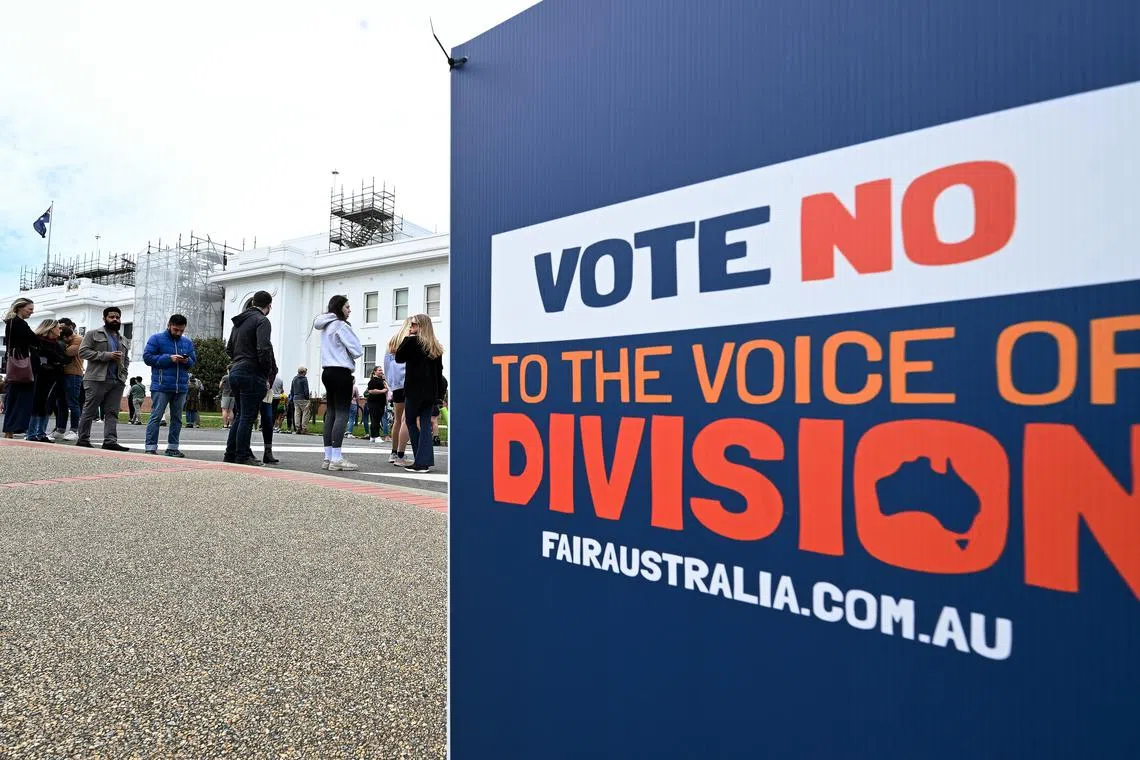Australia rejects indigenous referendum in setback for reconciliation
Sign up now: Get insights on Asia's fast-moving developments

Australians were asked to vote on whether they agree to alter the Constitution to recognise indigenous people and create a Voice to Parliament.
PHOTO: EPA-EFE
SYDNEY – Australia on Saturday decisively rejected a proposal to recognise indigenous people in the Constitution.
It is a major setback to the country’s efforts for reconciliation with its First Peoples.
Nationwide, with almost 70 per cent of the vote counted, the “No” vote led “Yes” 60 per cent to 40 per cent.
Australian broadcaster ABC and other TV networks have projected that a majority of voters in all six of Australia’s states would vote against the proposal.
Australians were asked to vote “yes” or “no” on whether they agree to alter the 122-year-old Constitution.
The change was aimed at recognising Aboriginal and Torres Strait Island people and to create an indigenous body, called the Voice to Parliament. This body was expected to provide advice to the government on indigenous issues.
Changes to Australia’s Constitution also require the support of at least four of the nation’s six states – a so-called double majority.
Prime Minister Anthony Albanese acknowledged it was not the outcome he had hoped for.
But he said the country would have to seek a new way forward to reconciliation.
“Our nation’s road to reconciliation has often been hard going,” Mr Albanese said in a televised news conference.
“Tonight is not the end of the road and is certainly not the end of our efforts to bring people together.”
The result will be a setback to reconciliation efforts with indigenous Australians.
It is also a political blow to the centre-left Labor government that has been in office for less than 18 months.
Mr Albanese had hoped the ballot would bring Australians together in a moment of unity. Instead, it has exposed division and raised allegations of racism.
He had initiated the referendum to give greater representation to Aboriginal and Torres Strait Islanders under a proposal put forward by indigenous elders in 2017.
But polls ahead of the vote had shown widespread opposition to the Voice to Parliament.

Electoral commission staff sorting and counting ballots at a counting centre in Melbourne on Oct 14.
PHOTO: EPA-EFE
Some Australians had expressed concern that it would divide the country by race and many were left unclear on how the body would operate.
The referendum’s failure will damage Mr Albanese politically and hurt him personally, with the Prime Minister having regularly shown emotion while campaigning for the amendment.
Setback for Albanese
Despite pre-referendum polls pointing to a defeat, indigenous Australians expressed anger and anguish that the white majority had rejected calls for a reckoning with the country’s bloody colonial past.
“This is a difficult result; this is a very hard result,” said Yes23 campaign director Dean Parkin.
“We did everything we could and we will come back from this,” he said.
The result also adds to the long history of failed referendums in Australia since the country’s founding in 1901, with just eight of now 45 efforts having succeeded.
The Voice has been a key feature of Mr Albanese’s term in office.
A referendum loss would stand out, political analysts say, as his biggest setback since coming to power in May 2022.
Opposition leader Peter Dutton criticised Mr Albanese for holding a referendum “that Australia did not need to have”.
“The proposal and the process should have been designed to unite Australians, not to divide us,” he told a news conference after the result was known on Saturday.
Australia’s indigenous citizens make up 3.8 per cent of the country’s population of 26 million. They have inhabited the land for about 60,000 years but are not mentioned in the Constitution.
By most socio-economic measures, the indigenous citizens are the most disadvantaged people in the country.
The Voice to Parliament was proposed in the Uluru Statement from the Heart, a 2017 document crafted by indigenous leaders that set out a road map for reconciliation with wider Australia.
Supporters of the proposal believe entrenching an indigenous voice into the Constitution will unite Australia and usher in a new era with its indigenous people.
Many indigenous people favour the change, but some say it is a distraction from achieving practical and positive outcomes.
In 1967, a referendum to count indigenous people as part of the Australian population was a resounding success with bipartisan political support.
The 2023 referendum had not garnered unified political support, with leaders of the major conservative parties campaigning for a “no” vote.
This is the first referendum in Australia in almost a quarter of a century, since Australian voters rejected a 1999 proposal to become a republic. REUTERS, BLOOMBERG


